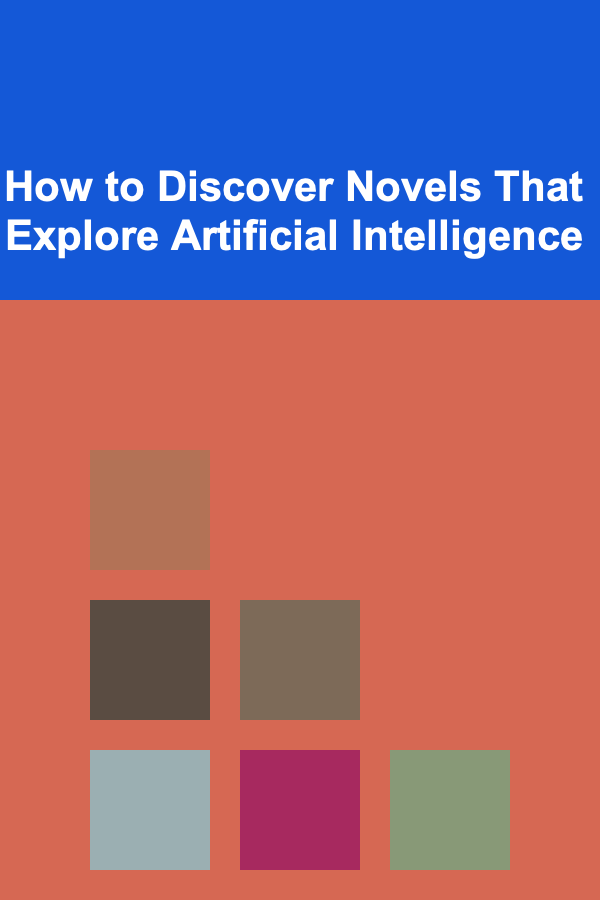
How to Discover Novels That Explore Artificial Intelligence
ebook include PDF & Audio bundle (Micro Guide)
$12.99$6.99
Limited Time Offer! Order within the next:

Artificial Intelligence (AI) has emerged as one of the most captivating and transformative concepts of the modern era. From its applications in everyday technology to its profound implications on society, AI has not only reshaped industries but also captured the imaginations of writers, philosophers, and thinkers across the world. The intersection of AI and literature is especially fascinating, as it allows for deep exploration of humanity, consciousness, and the future of technology. Novels that delve into artificial intelligence offer a window into speculative worlds where machines and humans interact in ways that challenge our understanding of life, morality, and the mind.
For those interested in discovering novels that explore AI, there's an exciting journey ahead. Whether you're a fan of classic science fiction or more contemporary works, there is a wealth of literature that tackles AI in diverse and profound ways. But where do you begin? How do you find novels that delve into AI without getting lost in the noise of mainstream fiction?
In this article, we'll explore how to discover novels that explore artificial intelligence, provide insight into key themes and genres, and recommend some notable works that have shaped the discourse on AI in literature. By the end of this article, you'll be equipped to dive into a world of AI-themed novels that expand the boundaries of human imagination.
Understanding AI in Literature
Before embarking on a journey to discover AI-themed novels, it's crucial to understand how artificial intelligence is typically explored in literature. AI in literature has evolved from being a simple tool or a plot device to a rich thematic focus, examining issues ranging from ethics to consciousness. The portrayal of AI in novels often reflects contemporary concerns about technology and its impact on society.
Thematic Focus of AI in Novels
AI in novels is often used to explore themes such as:
- Human-Machine Interaction: How do humans and machines coexist? Are they collaborators, adversaries, or something in between?
- Consciousness and Identity: Can a machine have consciousness? What does it mean to be truly alive or self-aware?
- Ethics and Morality: What ethical dilemmas arise when machines gain the ability to think, learn, or make decisions?
- Technology and Society: How does AI change the fabric of society? Does it lead to dystopia or utopia?
- Emotional Intelligence and Empathy: Can machines understand or replicate human emotions? How does this affect relationships and society?
Understanding these themes can guide you in your search for novels that delve into artificial intelligence, offering a deeper and more thoughtful reading experience.
How to Discover AI-Themed Novels
1. Explore the Science Fiction Genre
Science fiction (sci-fi) is the most prominent genre for exploring the concept of artificial intelligence. Classic sci-fi works paved the way for contemporary AI narratives, creating a rich tradition of exploring the unknown possibilities of technology. Authors of sci-fi have long asked questions about AI, and many of the greatest works in this genre focus specifically on machines that think, learn, and interact with humans.
Some key authors to look for include:
- Isaac Asimov : Known for his Robot series, Asimov's work lays the foundation for AI in literature. His Three Laws of Robotics have become an iconic framework for discussing machine ethics.
- Philip K. Dick : Famous for works like Do Androids Dream of Electric Sheep?, which explores the nature of consciousness through AI. His work often blurs the line between human and machine.
- Arthur C. Clarke : Clarke's 2001: A Space Odyssey introduces HAL 9000, one of the most famous AI characters in literature, raising questions about autonomy, trust, and control.
- William Gibson : Known for his cyberpunk novels, such as Neuromancer, which introduces a world of artificial intelligences, virtual realities, and post-human existence.
By seeking out these classic authors, you can immerse yourself in the foundational narratives that have shaped the way we think about AI in literature.
2. Check Out Recent Works in Speculative Fiction
While classic sci-fi is crucial for understanding the history of AI in literature, there are also numerous contemporary authors exploring AI in innovative and thought-provoking ways. These novels often reflect modern anxieties and hopes about technology, creating a rich body of work that pushes the boundaries of imagination.
In recent years, authors have turned to speculative fiction to explore AI in fresh ways. The genre allows for the exploration of alternate realities, futuristic societies, and dystopian worlds where AI plays a central role in shaping the future.
Some contemporary authors to look out for include:
- Liu Cixin : His Remembrance of Earth's Past trilogy, beginning with The Three-Body Problem, explores advanced civilizations, AI, and the potential for first contact with extraterrestrial intelligence.
- Neal Stephenson : Known for his works such as Snow Crash and The Diamond Age, Stephenson blends AI with themes of cybernetics, virtual reality, and the digital age.
- Margaret Atwood : In her MaddAddam trilogy, Atwood explores the relationship between humans and genetically modified organisms, AI, and the ethics of creation.
- Cory Doctorow : Doctorow's novels, such as Little Brother and Homeland, delve into issues of surveillance, data privacy, and AI's impact on society.
These authors offer fresh perspectives on AI and provide a contemporary lens through which to explore its potential impacts on society, politics, and the human condition.
3. Look into Cyberpunk and Dystopian Fiction
Cyberpunk and dystopian fiction are genres where AI plays a central role in shaping the world and its inhabitants. In these settings, AI often becomes a tool of power, surveillance, and control, exploring themes of oppression, rebellion, and the blurred lines between man and machine.
Cyberpunk novels frequently depict a future where corporations control AI, leading to issues of autonomy, freedom, and corporate surveillance. These works often critique the role of technology in exacerbating inequality and creating dystopian societies.
Some noteworthy cyberpunk and dystopian novels include:
- Neuromancer by William Gibson: One of the foundational works of cyberpunk, Neuromancer is a must-read for anyone interested in AI in literature.
- Altered Carbon by Richard K. Morgan: This novel delves into the concept of digital consciousness and AI in a future where people can transfer their minds into different bodies.
- The Windup Girl by Paolo Bacigalupi: Set in a dystopian future where biotechnology and AI intertwine, Bacigalupi's novel explores the consequences of unchecked technological progress.
Cyberpunk and dystopian fiction are key genres for exploring the darker, more cautionary aspects of AI, and they offer a unique way of looking at the social and political implications of intelligent machines.
4. Explore AI and Literary Fiction
While science fiction and speculative genres dominate the exploration of AI in novels, there are also literary works that touch on AI in more subtle or metaphorical ways. These works often examine AI in the context of human relationships, self-awareness, and the philosophical implications of creating life-like machines.
Some examples of literary novels that explore AI themes include:
- Klara and the Sun by Kazuo Ishiguro: This novel follows an AI character named Klara, an "Artificial Friend" designed to serve humans. It explores themes of loneliness, love, and the nature of consciousness.
- The Circle by Dave Eggers: A near-future novel that deals with surveillance, data privacy, and the role of AI in shaping modern society. It raises questions about the ethical implications of AI technologies in the corporate world.
- The Machine Stops by E.M. Forster: A classic short story that predates many modern AI novels, The Machine Stops is a dystopian narrative about a world where humans live underground and rely on machines for everything, raising questions about human dependence on technology.
These literary novels offer a deeper, more introspective look at AI, focusing on its psychological, emotional, and existential aspects.
5. Use Online Platforms and Communities
In the age of the internet, discovering novels that explore AI has become easier than ever. Various online platforms, forums, and book communities are dedicated to curating and recommending books based on specific themes, including AI. These platforms can help you discover novels that might not be as well-known but are equally thought-provoking.
Some helpful online platforms and communities to explore include:
- Goodreads: Goodreads is one of the largest book recommendation platforms, where you can find lists of AI-themed novels, reviews, and ratings from other readers.
- Reddit: Subreddits like r/scifi and r/books often discuss and recommend novels related to AI. You can also engage in discussions with other readers to discover new works.
- Book Blogs and Review Sites: Many book bloggers focus on speculative fiction and AI-related themes, offering reviews and recommendations for novels you might not encounter in mainstream bookstores.
By exploring these online resources, you can tap into a vast network of readers and experts who can point you toward lesser-known gems in the AI genre.
Notable Novels That Explore AI
To get you started on your journey, here are some key novels that explore AI:
- I, Robot by Isaac Asimov -- A classic collection of short stories that explore the ethical dilemmas and philosophical questions surrounding robots and AI.
- Do Androids Dream of Electric Sheep? by Philip K. Dick -- The novel that inspired the film Blade Runner, examining the line between humans and androids.
- Neuromancer by William Gibson -- A foundational cyberpunk novel that introduced the concept of the "matrix" and explores AI's role in a digital future.
- The Moon Is a Harsh Mistress by Robert A. Heinlein -- A novel that explores AI as a sentient being that assists in a revolution against an authoritarian government.
- Klara and the Sun by Kazuo Ishiguro -- A poignant exploration of AI and human emotions through the eyes of an Artificial Friend.
Conclusion
Discovering novels that explore artificial intelligence is a fascinating journey through the intersection of technology, philosophy, and imagination. Whether you're drawn to the cautionary tales of dystopian fiction, the intellectual puzzles of science fiction, or the emotional explorations of literary works, there is a wealth of literature that tackles the complex nature of AI. By understanding the themes, genres, and authors that focus on AI, you can dive deeper into the questions that shape our understanding of intelligence, consciousness, and the future of humanity.
From the classics of Isaac Asimov and Philip K. Dick to contemporary masterpieces like Klara and the Sun and The Three-Body Problem, the world of AI-themed novels is rich, diverse, and thought-provoking. Start exploring these novels today and prepare to be challenged, inspired, and perhaps even unsettled by the possibilities of artificial intelligence.

How To Create a Smoky Eye for Any Occasion
Read More
How to Start Investing in Stocks with Little Capital
Read More
How to Use Magnetic Strips for Easy Tool Organization
Read More
The Ultimate Sales Executive Handbook: Tips for Driving Revenue and Growth
Read More
How to Create a Worldbuilding Planner for Fantasy Writers
Read More
How to Create a Compelling Architectural Portfolio
Read MoreOther Products

How To Create a Smoky Eye for Any Occasion
Read More
How to Start Investing in Stocks with Little Capital
Read More
How to Use Magnetic Strips for Easy Tool Organization
Read More
The Ultimate Sales Executive Handbook: Tips for Driving Revenue and Growth
Read More
How to Create a Worldbuilding Planner for Fantasy Writers
Read More